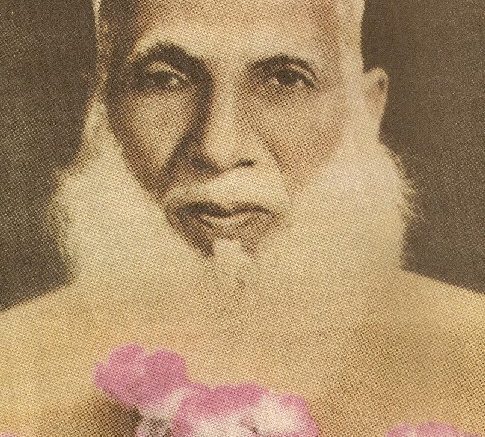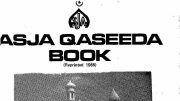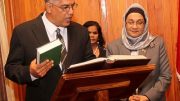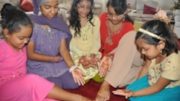This article is extracted from a 1946 Eid-ul-Fitr brochure. It is written in a manner representative of the contemporary reflection and knowledge of the author. Eid-ul-Fitr brochures are not academic papers thus the article would lack the rigour of such. These are commemorative publications that are printed and distributed at communal festive occasions. The article is to be treated as a contemporary report akin to an eye witness report and not to be judged on its historical accuracy. Thanks to Maulana Kavir Mohammed for providing the copy.
Wednesday, 28th August 1946
The idea that the first Muslims to come to this country were Indians is erroneous. When the Europeans carried on a lucrative slave trade from Africa they brought thousands of Muslims from that unfortunate country to the New World including Trinidad. But the Africans lost both their language and religion shortly after arrival. What could be expected from a race which had become chattels in the hands of their masters? In the place of their language English was planted and Islam was superseded by Christianity.
In the course of my investigation I discovered that the Africans who came to this country belonged to various tribes and among them the Madingos were predominantly Muslims, so that when these Madingo Muslims came into contact with Indian co-religionist, he was affectionately called by his Indian brother Madingo. Muslims in Trinidad especially in the rural districts are up to this day called Madingos. The same applies to British Guiana where Muslims are known as Foulards, the name given to a Negro tribe that was predominantly Muslims.
In my early boyhood I was shown a copy of the Holy Quran in Arabic by the late Wali Mohammed whose father, Sheikh Meeran, received it as a gift from an African Negro brother who was once a slave. The first immigrant ships arrived in this colony in 1845 with over 700 immigrants and among them one quarter were Muslims. These were the first Indian Muslims to arrive here. Since then there was a steady flow of indentured immigrants until the year 1916 when this vicious system known as Indian Immigration was brought to a close by the Government of India. There are approximately 180,000 Indians in Trinidad and among them more than one quarter are Muslims.
RELIGIOUS ACTIVITIES

Moulvi Ameer Ali
As soon as their numbers assumed a fair proportion in this Colony the Muslims began to think about maintaining and perpetuating their religion and so they turned their attention towards the building of Mosques and religious Schools where they could worship Allah, and impart religious knowledge to their children. They were faced with a difficult job. The great majority of them were illiterate. The recruiter in India saw to it that only those without any education be sent to the colonies. Educated people are always more difficult to manage than illiterates, therefore the few literates ha to conceal their education before passing the vigilant eye of the recruiters. In Trinidad they became the natural leaders, religious or otherwise, of their respective communities. It was upon their shoulders fell the task of keep he fair alive and seeing that it was passed on their offspring.
It is not quite clear as to exactly where the first Mosque was built. I had the privilege of meeting Sayed Ameerali of Tacarigua, a pious and devout Muslim who claimed that his was the first Mosque erected in this Island and Sheikh Bahadoor Ali of San Fernando who also claimed that he built the first Mosque at the Phillippine Estate, property of Sir Norman Lamont Hart. In my opinion both were built somewhat simultaneously. Then humble mosques were built of crude materials and thatched roof. It was at these Mosques for the first time the voice of the Muezzins was heard calling the faithful to prayer, and it was from this humble beginning sprang, the beautiful Mosques whose pictures today adorn the pages of the Eid-ul-Fitr Brochure.
It is remarkable how Muslim religious history has repeated itself in this far flung outpost of the British Empire. The Holy Prophet Mohammed (O.H.B.P.) had to flee from Mecca to seek asylum at the hands of the people of Medina. He built the first Mosque eighteen miles away from the Holy City. The first House of Allah was also built of crude material and thatched roof. It was from this humble beginning came forth some of the most magnificent edifice, known as Mosques in the world. The Mosques in Trinidad are used for worship and also as Schools imparting religious knowledge, Urdu and Arabic. There are at least sixty Mosques scattered all over the island which cater for the religious needs of 40,000 Muslims.
REMARKABLE ACHIEVEMENT
Although the Indian Muslims came to this country to labour in the Sugar and Cocoa fields it will be surprising for some to know how they managed to keep their religion successfully alive and how they perpetuated it for the whole hundred years. They have always acted as Imam, Philosopher Guide and Friend to their people. The remarkable achievement of some of these men is worthy of note.
In Port-of-Spain (St. James) Abdulla Khan spent the greater portion of his life doing voluntary religious work as Imam and teacher. Some of those tutored by him are still alive and are staunch Muslims. Baba Khan and Yacoub Khan, both of St. Joseph rendered yeoman service to the cause of Islam. A good many pupils of theirs are still alive. Shookrulla Meah, a venerable old gentleman who died recently and lived over 100 years, did wonderful work at Chaguanas and so did Hafiz Abdul Rahaman of Carapichaima and Sheikh Allahoodeen of Gasparillo who contributed much toward the upliftment of Islam.
But the real stalwart of these great leaders was Sheikh Hafiz Yacoub Ali. Then we had Sayed Abdool Aziz of Princes Town who was both a religious and political leader. The Indian community of Trinidad owe him a great debt of gratitude for the wonderful political services he so ably rendered. Again we had Bheekan Shah of Ne Plus Ultra who also rendered great services to the Muslims and who commanded the respect of the entire Indians of this colony. Today we have in our midst Haji Rookmudeen Sahib Quazi of the Muslims of Trinidad who has dedicated his life to the service of the people and religion. He has been President of the T.I.A. and also the Anjuman Sunat-ul-Jamat. He stands as the pillar of Islam in the Colony. He is an able and enlightened leader and his knowledge of the laws and ethics of Islam is unique in this part of the world. His entire life is devoted to the upliftment of his religion. He commands the esteem and respect of every community in Trinidad. We pray that Allah grant him long life and strength to continue the good work to which he devoted the greater portion of his saintly life, in the cause of Islam in this Island.





Be the first to comment on "1946: Muslims Here Celebrated Hundredth Eid"